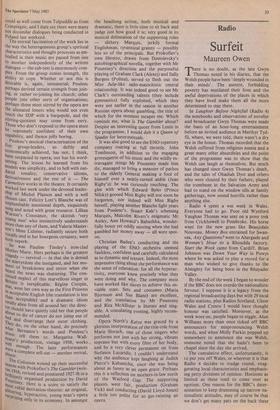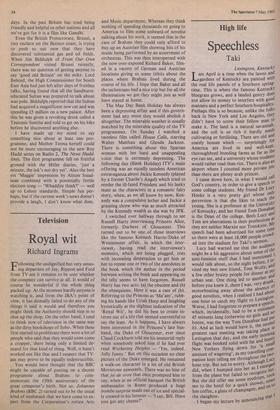Radio
Surfeit
Maureen Owen
There is no doubt, as the late Gwyn Thomas noted in his diaries, that the Welsh people have been 'deeply wounded in their minds'. The austere, forbidding poverty has mutilated their lives and the awful deprivations of the places in which they have lived make them all the more determined to stay there.
In Laughter Before Nightfall (Radio 4) the notebooks and observations of novelist and broadcaster Gwyn Thomas were made the basis of an hour-long entertainment before an invited audience in Merthyr Tyd- fil, where, we were told, there wasn't a dry eye in the house. Thomas recorded that the Welsh suffered from religious mania and a great many other absurdities and the point of the programme was to show that the Welsh can laugh at themselves. But much has changed since Gwyn Thomas's death, and the tales of Obadiah Dyer and others who were clouted by their fathers, played the trombone in the Salvation Army and had to stand on the window sills at family gatherings, now sound horrific rather than anything else.
Radio 4 spent a wet week in Wales. Everyone had to go. Poor old Wynford Vaughan Thomas was sent on a pony trek from Crickhowell to Pembroke. His horse went for the new grass like Beaujolais Nouveau. Money Box entrained for Swan- sea, Any Questions? went to Abergaele and Woman's Hour to a Rhondda factory. Start the Week came from Cardiff. Brian Johnson was Down Your Way in Powys where he was asked to play a record for a man who wished to give thanks to the Almighty for being born in the Rhayader Valley.
By the end of the week I began to wonder if the BBC does not overdo the nationalistic fervour. I suppose it is a legacy from the regional broadcasting days but with 29 local radio stations, plus Radios Scotland, Ulster Wales and Cymru I would have thought honour was satisfied. Moreover, as the week wore on, people began to niggle. Alun Williams more than once ticked off BBC announcers for mispronouncing Welsh words, and when Molly Parkin popped up somewhere to announce she was Welsh, someone noted that she hadn't been to chapel since the day she arrived.
The cumulative effect, unfortunately, is to put you off Wales, or wherever it is that Radio 4 decides to trudge round, exag- gerating local characteristics and emphasis- ing petty divisions of opinion. Horizons as limited as these tend to come over as egotism. One reason for the BBC's deter- mination to keep drumming up narrow na- tionalistic attitudes, may of course be that we don't get many pats on the back these
days. In the past Britain has tried being friendly and helpful to other nations and all we've got for it is a film like Gandhi.
Even the British Protectorate, Brunei, a tiny enclave on the Borneo coast, is trying to push us out now that they have discovered substantial gas and oil fields. When Jim Biddulph of From Our Own Correspondent visited Brunei recently, there was no question of getting anyone to say 'good old Britain' on the mike. Lord Belsted, the High Commissioner for South East Asia had just left after days of fruitless talks, having found that all the Sandhurst- educated Sultan was prepared to talk about was polo. Biddulph reported that the Sultan had acquired a magnificent new car and was spending £5 million on a new palace. After this he was given a revolting drink called a Teutonic Sunrise and told to get on his bike before he discovered anything else.
I have made up my mind to say something nice about at least one pro- gramme, and Mother Teresa herself could not be more encouraging to the new Roy Hudd series on Radio 2, The News Hudd- lines. The first programme fell on fruitful ground with the Hitler diaries, 'just a minute, the ink's not dry yet'. Also the best yet 'Maggie' impression by Alison Stead- man combined with a potentially fertile election song — 'Whaddya think?' — well up to Lehrer standards. Simple fun per- haps, but if the current week's news doesn't provide a laugh, I don't know what does.











































 Previous page
Previous page